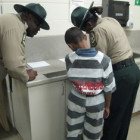
Georgia’s juvenile code rewrite may have hit another bump on its long road to passage. In a letter signed by Athens-Clarke County, Ga., District Attorney Kenneth Mauldin, the District Attorney’s Association of Georgia asked the Georgia Assembly’s Advisory Committee on Legislation to “withhold consideration” of the bill currently in the State House containing the rewrite.
Mauldin, writing in the nine-page letter addressed to Advisory Committee Chairman Charles Clay, argues the bill places an additional burden on the DA’s office. Additionally, it would cost the taxpayers of each county at least $5.3 million each year to pay for an additional assistant district attorney and staff to handle the increased workload.
Mauldin added that the measure, HB 641, requires the prosecuting attorney to decide whether to charge a child with a delinquent act. According to the letter, only a few districts in Georgia currently follow this practice.
Mainly, however, the letter focuses on the added financial burden that could be placed on district attorneys' offices, estimated at some $20,000 million by the association.
“We would ask,” Mauldin writes, “that the committee recognize that implementation of this important measure will require a financial commitment by state and local governments — a commitment that in the present, economic climate may not be available.
Mauldin goes on to say a consensus may be reached by using a “collaborative approach.”
Kirsten Waldman, director of Policy and Advocacy at the Barton Child Law and Policy Center at Emory University School of Law, said the District Attorney's Association has been a "great partner" in the effort to rewrite the state's juvenile code and that she has confidence the remaining differences can be bridged.
"We are still trying to gain the support of the association and we believe we'll get it," she said. "The more substantive disagreements have already been dealt with. Now, we're just dealing with some of the minor points. We should be able to resolve these."









